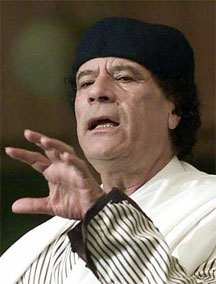TRIPOLI/SFAX, Tunisia, (Reuters) – Forces loyal to Libyan leader Muammar Gaddafi are staging a “massacre” in the besieged city of Misrata, evacuees said yesterday, as Libya said it was ready to discuss political reform, led by Gaddafi.
Libyan TV showed footage of Gaddafi saluting supporters outside his fortified compound in Tripoli. But some residents of the capital, angered by fuel shortages and long queues for basic goods caused by a popular revolt and Western sanctions and air strikes, began openly predicting his imminent downfall.
Government spokesman Mussa Ibrahim said Libya was ready for a “political solution” with world powers.
“We could have any political system, any changes: constitution, election, anything. But the leader has to lead this forward,” he told reporters when asked about the content of negotiations with other countries.

With Libya in chaos, an official in neighbouring Algeria told Reuters al Qaeda was exploiting the conflict to acquire weapons, including surface-to-air missiles.
The U.S. State Department said it had raised concerns with the Libyan rebels about the Islamist group obtaining arms in the east of the country, where they are battling Gaddafi’s forces.
Evacuees from Misrata, the rebels’ last major stronghold in western Libya, described the city as “hell”. They said Gaddafi’s troops were using tanks and snipers against residents, littering the streets with corpses and filling hospitals with the wounded.
“You have to visit Misrata to see the massacre by Gaddafi,” said Omar Boubaker, a 40-year-old engineer with a bullet wound to the leg, brought to the Tunisian port of Sfax by a French aid group. “Corpses are in the street. Hospitals are overflowing.”
Misrata rose up with other towns against Gaddafi last month but most others have been retaken by government forces.
“I could live or die, but I am thinking of my family and friends who are stranded in the hell of Misrata,” said tearful evacuee Abdullah Lacheeb, who had serious injuries to his pelvis and stomach and a bullet wound in his leg. “Imagine, they use tanks against civilians. He (Gaddafi) is prepared to kill everyone there.”
GADDAFI GREETING
State TV showed what it said was live footage of Gaddafi briefly waving to supporters through the roof of a Jeep outside his compound while bodyguards tried to prevent them mobbing him.
But in the lanes of Tripoli’s medieval market, some openly forecast his fall as rebels battle his forces in eastern Libya.
“People from the east will come here. Maybe in two weeks,” said one entrepreneur who asked that his name not be used for fear of reprisals. “But now, people are afraid.”
Stalemate on the frontline in the east, defections from Gaddafi’s circle and the plight of civilians caught in fighting, or facing shortages, have prompted a flurry of diplomacy.
Turkey said it was seeking to broker a ceasefire as an envoy from Gaddafi’s government travelled to Ankara from Athens.
“Turkey will continue to do its best to end the suffering and to contribute to the process of making a road map that includes the political demands of Libyan people,” Foreign Minister Ahmet Davutoglu said.
Turkey also expected en-voys from the rebel National Council soon, he added. A Turkish official said both sides “conveyed that they have some opinions about a possible ceasefire”.
ITALY SAYS GADDAFI
MUST GO
Spokesman Ibrahim said Libya was ready to listen to outside reform proposals and “try our best to meet you in the middle”.
But he added: “No one can come to the Libyan nation and say to them: ‘You have to lose your leader, or your system, or your regime’ … Who are you to say that?”
Italian Foreign Minister Franco Frattini dismissed Libya’s stance. “A solution for the future of Libya has a pre-condition: that Gaddafi’s regime leaves and is out and that Gaddafi himself and his family leave the country,” he said.
In Washington, the U.S. Treasury said it had lifted sanctions against former Libyan foreign minister Moussa Koussa in the hope that other senior officials would defect.
Koussa fled to Britain last week.
Scottish police, who want to question him over the 1988 Lockerbie airliner bombing, for which Libya accepted responsibility and paid compensation to relatives of the 270 dead, were expected to meet him within days.
U.N.-mandated air strikes to protect civilians, led by the United States, France and Britain, have so far failed to halt attacks in Misrata by the Libyan army.





